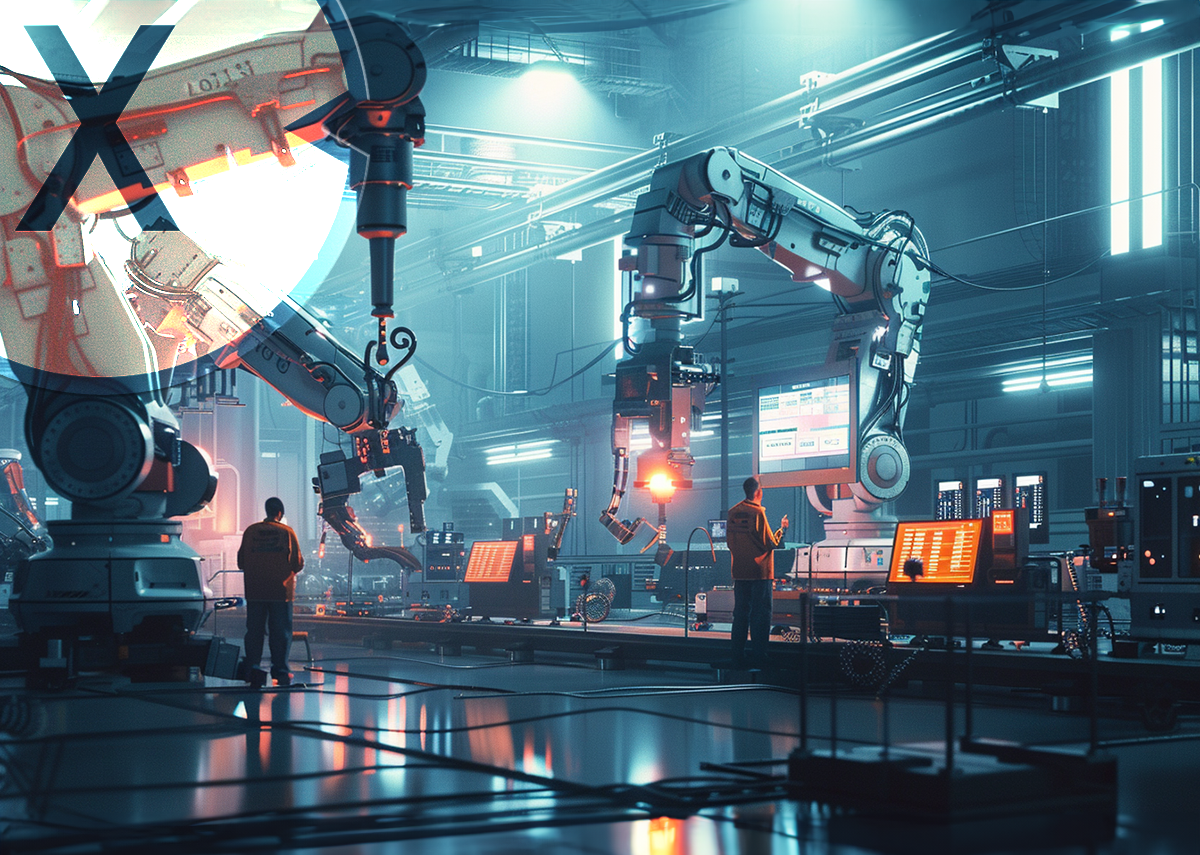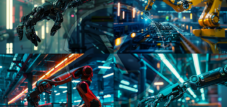
Are AI language models used in industry, e.g. robotics, automation processes, smart factories or traffic control systems? – Image: Xpert.Digital
🤖🏭 Are AI language models used in industry?
🚦🦾 Yes, AI language models are used in industry. They are used in many areas such as customer service automation, personalized content marketing, data analysis, business process optimization and voice assistant development. These models help to efficiently process large amounts of text data and gain valuable insights.
🤖 The use of AI language models in robotics and automation: opportunities and limitations
Artificial intelligence (AI) has made significant progress in recent years and is playing an increasingly important role in many areas of industry and research. In particular, AI language models, such as those trained by machine learning and neural networks, are capable of understanding and generating natural language. This raises the question of whether and how these models can be used in specific industrial areas such as robotics, automation processes in smart factories or in the control of a digital twin in traffic control systems.
More about it here:
🦾 The use of AI language models in robotics
In robotics, communication between humans and machines is a crucial aspect. AI language models, such as the GPT model developed by OpenAI, have the potential to simplify and improve these interactions. They enable robots to understand natural language and respond to human commands. This can make the use of robots in various areas more efficient and accessible. For example, an employee in a manufacturing plant could give a robot simple voice commands to complete specific tasks without having to use complex programming languages. This would speed up workflows and increase user-friendliness.
However, there are also limits to the use of language models in robotics. Language models are typically specialized in processing text and speech and do not necessarily have the ability to interpret complex physical environments or sensory data. However, in robotics, precise movements and real-time data processing are often required to ensure that a robot functions correctly. Therefore, AI language models are typically used in combination with other AI systems that specialize in sensory input processing and motion control. This combination allows robots to respond to voice commands on the one hand and to carry out physical tasks precisely on the other.
More about it here:
⚙️ Automation processes in smart factories
Smart factories, also known as intelligent factories, are at the center of the fourth industrial revolution, often referred to as Industry 4.0. These factories use a variety of advanced technologies, including the Internet of Things (IoT), AI and automation, to optimize and make production processes more flexible. In this context, the question arises as to whether AI language models can also play a role in these automation processes.
Fundamentally, AI language models have the potential to support the human factor in smart factories by acting as an interface between the human operator and the automated machines. By using voice commands, operators could control production machines, obtain information about current production status, or perform error diagnostics. This would increase efficiency and facilitate interactions with complex systems.
However, it is important to emphasize that most smart factories use specialized AI systems designed to address the specific needs of automation and process control. These systems are capable of analyzing large amounts of data in real time to make decisions and optimize processes. AI language models usually play a supporting role here by facilitating communication between humans and machines, while the actual automation processes are controlled by other AI systems specializing in machine learning and data processing.
Suitable for:
🚦 The digital twin in the traffic control system
Another exciting field of application for AI is the use of the so-called digital twin in traffic control systems. A digital twin is a virtual replica of a physical object or system that allows data to be collected and analyzed in real time to optimize processes and make decisions. In traffic control systems, for example, a digital twin could be used to monitor traffic in real time, identify bottlenecks and direct traffic flows more efficiently.
In this context, the question arises as to whether AI language models can play a role in controlling a digital twin. In principle, such models could be used to facilitate the interaction between the operators of the traffic control system and the digital twin. For example, an operator could use voice commands to retrieve specific data or perform analysis. This could increase usability and enable quicker response to changing traffic conditions.
However, the actual control of the digital twin in a traffic control system is usually carried out by specialized AI systems that are designed to process large amounts of data and optimize complex processes. These systems use machine learning to analyze traffic flows and make predictions. In this context, AI language models play more of a supporting role by acting as an interface for communication between humans and machines.
Suitable for:
❓ Which AI systems are actually used?
Although AI language models can be useful in certain areas of robotics, automation, and traffic control systems, they are typically not the primary systems used to control these processes. Instead, specialized AI systems are used that are designed for machine learning, deep learning and data analysis.
Robotics often uses reinforcement learning and computer vision-based models that enable robots to understand their environment and move accordingly. Smart factories use AI systems that can analyze large amounts of sensor data in real time to optimize production processes. And in traffic control systems, digital twins use machine learning to analyze traffic data and optimize traffic flows.
These specialized AI systems are capable of controlling complex physical processes and processing large amounts of data in real time, while AI language models typically play a supporting role by facilitating human-machine communication.
More about it here:
- What other AI models are there besides the AI language model?
- Different AI models and typical areas of application
🧠 AI language models and specialized AI systems
AI language models certainly have enormous potential to be used in robotics, automation and traffic control systems. They make it possible to understand and generate natural language, which can significantly facilitate human-machine interaction. However, they are typically not the primary systems used to control these complex processes. Instead, specialized AI systems are used that are designed to process sensor and real-time data and are able to efficiently control and optimize physical processes. However, in the future, AI language models could play an increasingly important role, especially when combined with other advanced AI technologies.
📣 Similar topics
- 🤖 The role of AI language models in robotics
- 🏭 Increasing efficiency through AI language models in smart factories
- 🚦 Control of traffic control systems with digital twins and AI
- 💬 Voice control for industrial automation: opportunities and challenges
- 🌐 Industry 4.0: How AI language models are revolutionizing smart factories
- 📈 Data analysis and optimization: AI language models in use
- 🎛️ Human-machine interaction: The breakthrough of AI language models
- 🚀 Optimize automation processes with AI language models
- 🌉 Bridge between humans and machines: AI language models in industry
- 👾 Digital twins and AI language models: vision of the future
#️⃣ Hashtags: #AI #Robotics #Automation #Industry40 #Trafficsystems
We are there for you - advice - planning - implementation - project management
☑️ SME support in strategy, consulting, planning and implementation
☑️ Creation or realignment of the digital strategy and digitalization
☑️ Expansion and optimization of international sales processes
☑️ Global & Digital B2B trading platforms
☑️ Pioneer Business Development
I would be happy to serve as your personal advisor.
You can contact me by filling out the contact form below or simply call me on +49 89 89 674 804 (Munich) .
I'm looking forward to our joint project.
Xpert.Digital - Konrad Wolfenstein
Xpert.Digital is a hub for industry with a focus on digitalization, mechanical engineering, logistics/intralogistics and photovoltaics.
With our 360° business development solution, we support well-known companies from new business to after sales.
Market intelligence, smarketing, marketing automation, content development, PR, mail campaigns, personalized social media and lead nurturing are part of our digital tools.
You can find out more at: www.xpert.digital - www.xpert.solar - www.xpert.plus

